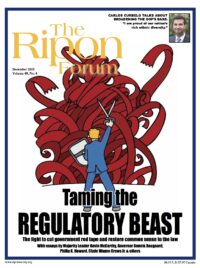
Seldom has there been such widespread agreement in Washington among Republicans and Democrats, Senators and House members, and most of the general public: Congress doesn’t function and something needs to change, soon.
The reasons why Congress doesn’t work are many. They cross party lines. They go beyond just Congress to the Executive Branch. They are affected by and in some cases caused by the media. They have caused public trust in their government to evaporate.
There is no sense pointing the finger of blame. There’s plenty to go around, and blaming others may be good politics, but it accomplishes nothing for the American people.
So, what to do? The first step to solving a problem is to understand it. The primary problem with Congress is that the legislative and political processes that dictate how we govern are outmoded and inoperable today. They must be reformed. The second step is finding a means to that end – a legislative vehicle for bringing about a change in the rules and a change in the law that will make Congress effective once again.
The primary problem with Congress is that the legislative and political processes that dictate how we govern are outmoded and inoperable today.
Let me give you a critical example of what’s broken, torn from the pages of the annual appropriations process.
As a former Chairman of the House Appropriations Committee, I believe it is imperative that the appropriations process be among the highest priorities for reform.
The Constitution specifically gives the Legislative Branch the power to spend money. Article 1, Section 9, Clause 7 reads: “No money shall be drawn from the treasury, but in Consequence of Appropriations made by law…”
This provision is the foundation of Congress’s “power of the purse” and is a duty the legislative branch undertakes each year. This process enables Congress to affirm the country’s priorities and set specific amounts for Federal programs and agencies. Congress has for most of its existence achieved this by dividing the funding of most activities of government – transportation, homeland security, defense, education, foreign aid and other basic government operations – into individual appropriation bills, now 12 in number. Both Houses of Congress are supposed to pass these bills separately and reconcile their differences by the beginning of the next fiscal year that starts on October 1st. That hasn’t been done correctly since 1996. I know. I did it.
Here’s the problem. The Congressional Budget and Impoundment Control Act of 1974 requires Congress to first adopt an annual budget that sets spending levels for all of government. This relatively new budget process has made it difficult for the houses of Congress to produce its individual appropriation bills on time, or at all. The process is subject to constant delays and politicization.
Over these last 40-plus years, the Congress has only been able to complete all its appropriation bills on time on only four occasions.
Congress has more frequently, when encountering deadlines it can’t meet, resorted to interim funding or a packaging of some of the bills to prevent any stoppage of the necessary operations of government. But what was meant to be an emergency back-up procedure has become the regular order of the day. For more than a decade, the Congress has essentially extended the fiscal year for several months through continuing resolutions, and then at the last minute has had to pass all the appropriation bills in one omnibus bill. This results in the Congress voting on entire funding of government in one up-or-down vote on one piece of legislation with thousands of pages, with usually only the majority party voting “aye.”
This is bad government, bad politics and bad business for the country. This has also got to change. Some of that change must come in the Senate where supermajority votes are required under their rules to proceed to consider individual bills. This makes individual appropriations difficult if not impossible to pass there.
Add to that toxic mix a continuing failure in both the House and Senate authorizing committees to authorize federal programs and agencies under their jurisdiction, including the establishment of the funding levels that guide what the appropriators ultimately fund.
This means that appropriation bills are also burdened with legislative language continuing many policy provisions (authorizations) in their bills. There are now annually more than $300 billion in unauthorized appropriations, many of which are absolutely critical to the national welfare, such as Homeland Security. The Congress must also recognize the need to force the authorizing committees to fulfill their responsibilities.
Now is the time for Members of Congress to regain their rightful stature and work together on finding a process to restore and preserve their constitutional responsibilities over appropriations.
During the last effort at legislative reorganization, there was little focus on the appropriations process, as then Senate Appropriations Chairman Byrd testified not to encumber the process: “We need to make the goal not one of efficiency, but one of effectiveness.”
I agree that we must preserve the fundamentals of a separate appropriations process, but procedures must be changed. We currently are disenfranchising the rights of individual members by denying them their right to influence and vote on the individual bills. We must examine whether the current fiscal year deadline is the proper date, and find a way to expeditiously move funding bills through both Houses of Congress and into conferences to resolve their differences.
James Madison believed that the “power of the purse” was the central responsibility of representative government. As he penned in Federalist Paper 58: “The power over the purse may, in fact, be regarded as the complete and effectual weapon with which any constitution can arm the immediate representatives of the people, for obtaining redress of every grievance and for carrying into effect every just and salutary measure.”
Now is the time for Members of Congress to regain their rightful stature and work together on finding a process to restore and preserve their constitutional responsibilities over appropriations.
It is one more reason, one among many, for the Congress to create a special Joint Committee on the organization of Congress, which can serve as a repository for reform and make recommendations to the full Congress. Reform should not occur on a piecemeal basis. It has to be done comprehensively to produce meaningful results worthy of the peoples’ trust.
Let’s call it the Joint Committee on the Congress of Tomorrow, because it is the future we need to be concerned about. Let this be the first step to move the Congress and the Executive into the 21st Century of effective, consensus-driven, public interest governance.
Robert L. Livingston is a Founding Partner of The Livingston Group. He represented the 1st District of Louisiana in the U.S. House of Representatives for 22 years, and served as Chairman of the Appropriations Committee from 1995 until his retirement in 1999.





